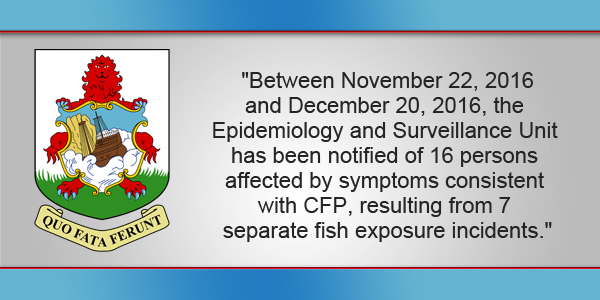Ministry: Increase In Ciguatera Fish Poisoning
There has been an increase in reported cases of Ciguatera Fish Poisoning, with 16 people affected by symptoms consistent with CFP between November 22, 2016 and December 20, 2016, the Government said.
The statement said, “The Epidemiology and Surveillance Unit [ESU] [Ministry of Health and Seniors], and the Department of Environment and Natural Resources [Ministry of the Environment] would like to inform the public of an increase in reported cases of Ciguatera Fish Poisoning [CFP] in the community.
“The number of cases in 2016 is high when compared to zero cases reported in the previous five years. Ciguatera Fish Poisoning affects tropical fisheries around the world but is not common in Bermuda.
“In January 2016, three persons were sickened by eating portions of one fish. Between November 22, 2016 and December 20, 2016, the Epidemiology and Surveillance Unit has been notified of 16 persons affected by symptoms consistent with CFP, resulting from 7 separate fish exposure incidents.
“CFP is caused by toxic chemicals that are produced by microscopic marine plants called Gambierdiscus, which occur in tropical and subtropical waters. These microscopic plants can attach to the surface of larger seaweeds, and so may be eaten along with that seaweed by herbivorous fish.
“The fish themselves are not affected by the toxin, but the toxins build up in individual fish and are magnified in the food chain when big, predatory fish eat large amounts of smaller herbivorous fish.
“The chemicals–called ciguatoxins–act as a nerve toxin in humans. Different Gambierdiscus species produce different toxins that may have different effects on people. Ciguatoxins do not change the appearance, taste or smell of a fish, and are not affected by cooking or freezing. There is no simple detection test.
“The fish identified so far in the recent local outbreak are large amber jacks [bigger than 20 lbs] and large yellow jacks. The Jack family can be migratory, so research will be done to see if this is a local CFP issue or one ‘imported’ by migratory species.
“Symptoms of CFP are highly variable and depend on which species of Gambierdiscus is the source of the toxin, the size of the fish [larger predatory fish can have a greater concentration of the toxin], and the amount of fish consumed. Children and the elderly are often more sensitive. If you believe you have CFP, try to retain and freeze a sample of any suspect fish, whether fresh or cooked, for future analysis.
“Common symptoms experienced in this outbreak include numbness, itching, burning and tingling in fingers, toes and around the mouth, joint and muscle pain, weakness and the reversal of hot and cold sensations. This last symptom is highly indicative of CFP.
“Additional symptoms include gastrointestinal symptoms such as nausea, vomiting, abdominal cramping, and diarrhoea. Symptoms may begin as little as one hour after consuming toxic fish and can persist for an extended period of time. Symptoms may recur with greater severity if additional toxic fish is eaten. Most affected persons recover completely. See your physician if you believe you have symptoms of CFP.
“The Department of Environment and Natural Resources and the Department of Health are collaborating to develop a plan for broader testing of the local fish species that form the mainstay of our commercial and recreational fisheries.
“It is also important to identify the source of the toxin. A previous scientific study found only one Gambierdiscus species in Bermuda, and that species produces little to no toxin. More extensive field sampling to collect and evaluate Gambierdiscus species on Bermuda reefs is planned for summer 2017.
“A better understanding of potential local sources of CFP will allow the Ministries to make more informed decisions about how to manage CFP in Bermuda.”
Read More About
Category: All, Environment, News




Thanks for the info.
Foreign fish.
I hope Santa gets you a new wooden spoon for Christmas Onion Juice.
As much as you like to steer the pot! It’s wearing thin
Radiation in canned tuna from the pacific. Soon come. Watch.
Don’t worry. You can hang the can from your ears like earrings and that will protect you from the ‘radiation’.
This whole thing sounds fishy to me!